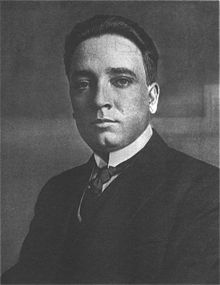Baltasar Brum
| Baltasar Brum Rodríguez | |
|---|---|

Baltasar Brum
|
|
| 23rd President of Uruguay | |
|
In office March 1, 1919 – March 1, 1923 |
|
| Prime Minister |
Feliciano Viera José Batlle y Ordóñez |
| Preceded by | Feliciano Viera |
| Succeeded by | José Serrato |
| 6th Prime Minister of Uruguay | |
|
In office March 1, 1929 – March 1, 1931 |
|
| President | Juan Campisteguy |
| Preceded by | Luis C. Caviglia |
| Succeeded by | Juan Pedro Fabini |
| Personal details | |
| Born |
June 18, 1883 Artigas Department, Uruguay |
| Died | March 31, 1933 (aged 49) Montevideo, Uruguay |
| Nationality | Uruguayan |
| Political party | Colorado Party |
Baltasar Brum Rodríguez (June 18, 1883 – March 31, 1933) was a Uruguayan political figure. He was President of Uruguay from 1919 to 1923.
His political convictions closely followed those of liberal President José Batlle y Ordóñez, under whom Brum served as Education Minister 1913 - 1915. He was Interior Minister from 1915 - 1916.
Brum subsequently served as Foreign Minister under the Presidency of Feliciano Viera; in the latter capacity, Brum was noted for promoting good relations with the United States, which had joined World War I against Germany in 1917.
Brum's period of office as Foreign Minister proved to be somewhat controversial. In the autumn of 1917, American warships sailed to the Argentine capital Buenos Aires and a delegation issued threats to the country's President Hipólito Yrigoyen, in relation to the country's neutrality, which the United States insisted should be more clearly focused as being pro-American. Yrigoyen refused to be bowed by such threats from a military delegation, whereupon the American ships sailed to Montevideo, where they were warmly welcomed by Brum, in contrast to the guarded reception which the delegation had received in Buenos Aires. Brum later travelled to the United States and was received by the Secretary of State.
Brum thus came to Presidential office in 1919 as one with a reputation as a pro-American facilitator of US interests.
During Brum's Presidency, he was noted for pursuing economic stability, but on the political front faced significant opposition from both his own Colorado Party, and notably from Luis Alberto de Herrera of the Blanco, or National, Party.
Beyond the strictly political, Baltasar Brum was noted for interests in Uruguayan history and folklore. During his Presidential term of office he took measures with a view to preserving and protecting the historic Fort of Santa Teresa in the Rocha Department and after leaving office Brum collaborated in the preparation of related literature.
...
Wikipedia
